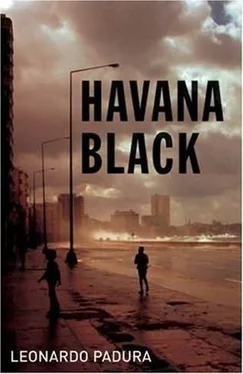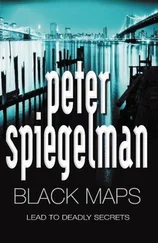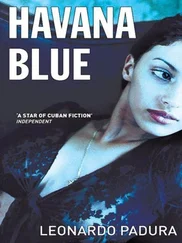Skinny Carlos, who had long since ceased to be skinny, looked at Andrés. The friendship existing between them had been cementing for twenty years and there were very few secrets between them. But recently something had turned in Andrés’s brain. That man they’d first admired when he was the best college baseball player, applauded by all his comrades, with the manly merit of losing his virginity to a woman so beautiful, so crazy and so desirable that they all would have loved to give up everything, even their lives, to her. The very same Andrés who would become the successful doctor they’d all consult, the only one who had managed an enviable marriage, two children included, and had been privileged to have his own house and private car, was now revealing himself as a man full of frustrations and rancour, which embittered him and poisoned the atmosphere around him. Because Andrés wasn’t happy, was dissatisfied with his lot and made sure all his friends knew it: something in the projects he held most dear had failed, and his path in life – like all of theirs – had taken predetermined undesirable turnings to which they’d never consented as individuals.
“All right, let’s assume you are right.” Carlos nodded resignedly, drinking a long draught and then adding: “But you can’t live thinking like that.”
“Why not, wild man?” the Count intervened, puffing out smoke and recalling that afternoon’s alcoholic suicidal impulses.
“Because then you have to accept it’s all a load of shit.”
“And isn’t it?”
“You know it isn’t, Conde,” declared Carlos, looking at the ceiling from his wheelchair. “Not everything, right?”
He collapsed on his bed, head thick with alcoholic vapours and Andres’s lament for a generation. Lying there, he started to undress and throw each garment on the floor. He could already predict the headache he would have at daybreak, a just punishment for his excesses, but he felt his mind racing along enjoyably, strangely active, spawning ideas, memories and obsessions endowed with a feverish fleshly quality. With a supreme physical effort, he abandoned his bed and went to the bathroom in search of the analgesics that could thwart his recurrent migraine. He reckoned two would suffice, and dissolved them in water. He then walked to the lavatory, where he piddled a weak, amber trickle that splashed on the bowl’s already stained edges and made him consider the proportions of his member: he’d always suspected that it was on the small side and now he was certain – pitifully so – after the strip show he’d offered his friends that evening. But mentally he shrugged his shoulders at its nonimportance, for, even as it was, the currently moribund strip of meat had always been an effective companion to his binary or solitary erotic outings, even rising up rapidly when necessity required it to be on a war footing. Ignore those sons of bitches, he told it, looking at it head on, right in the eye: don’t feel pathetic, because you’re a good’un, aren’t you? And he gave it a last shake.
He was pleasantly surprised when he realized he didn’t have to go to work the following day, and, lungs full of the air of freedom and cigarette smoke, he decided to waste no more time in that lonely bed. You are going to change your life now, Mario Conde, he reproached himself, and decided on a useful wakefulness. The exercise of independence was one of the privileges of his new situation. He quickly went into the kitchen and put a flame under the coffee pot, ready to drink his morning infusion in order to trick his body and restore the energy necessary for what he wanted to do: sit down and write. But what the fuck are you going to write? Well, about what Andrés said: he would write a story of frustration and deceit, of disenchantment and futility, of the pain of discovering you had taken the wrong turning at every point, whether you were to blame or not. That was the great experience of his generation, which was so secure and well nourished that it grew with every year, and he concluded it would be good to put it in black and white, as the only antidote against the most pathetic oblivion of all and as a practical way of reaching once and for all the diffuse kernel of that whole unequivocal equivocation: when, how, why and where had it all begun to fuck up? How much were they each to blame, if at all? How much was he? He sipped his coffee slowly, now seated in front of the white sheet, bitten by the platen of his Underwood, and realized it would be hard to transmute those certainties and experiences, twisting in his gut like worms, into the squalid and moving story he needed to tell. A tranquil story like that of the man who tells a child about the habits of the bananafish and then blows his brains out because he can’t find anything better to do with his life. He looked at the unpolluted paper, and realized that his desires alone wouldn’t suffice to defeat that eternal eight and half by thirteen inch challenge into which the chronicle of an entire wasted life should fit. He needed an illumination like Josefina’s, able to provoke the poetic miracle of extracting something new from a daring mix of lost, forgotten ingredients. And so he started to think of the hurricane again, still only visible in the newspaper: something like that was necessary, ravaging and devastating, purifying and righteous, for someone like him to regain the possibility of being himself, myself, yourself, Mario Conde, and for that deferred state to be resurrected that could beget a little beauty or pain or sincerity on to that mute, empty, defiant paper, where he finally wrote, as if overcome by an irrepressible ejaculation: “The youth slumped to the ground, as if pushed, and rather than pain he felt the millenary stench of rotten fish issue forth from that grey, alien land.”
***
“What are you doing here, Manolo?” asked the Count when he opened the door to see the unexpected, skeletal face of Sergeant Manuel Palacios, his companion in detection over recent years.
Something about his face revealed a state of shock – the squinting eye more lost than ever behind an ample nostril – and the Count knew immediately that his own face was the cause.
“You ill, Conde?”
“Like hell I’m ill. I was up writing all night,” he replied, and felt an aesthetic well-being as he offered that explanation: he imagined the marinated bags under his eyes and the exhausted eyelids, but was happy to have the poetic justification, even if it wasn’t altogether true: various badly scarred sheets of paper were the only real fruits of hours of application.
“Ah, so you’re back on that track. So be it,” declared the sergeant, wagging a finger at him.
“And might one enquire what brings you here?”
Manolo smiled sweetly.
“I came to get you.”
“But I left the force three days ago.”
“That’s what you think. The new boss says he wants to you to come in and discuss your departure with him.”
“Tell him I can’t today, tell him I’m writing.”
Manolo smiled, broadly this time. “He told me not to accept any excuses.”
“And what will they do to me if I don’t go? Kick me out of the police?”
“Or put you inside, for lack of respect. That’s what he said…” went on Manolo, spelling out the details of his orders before finally finding his own voice. “Do you really want out, Conde?”
“Yes, I really do. Come in, I’ll make us some coffee.”
They sat in the kitchen waiting for the coffee to percolate, while Manolo recounted recent events at Headquarters. Only eleven out of sixteen detectives remained and it was like an angry hornets’ nest. The files of all those who still survived were under review yet again, and there was talk of a fresh round of interrogations of each and every one of them: it was a merciless hunt to the death, as if someone had decreed the necessary extinction of a dispensable species.
Читать дальше











